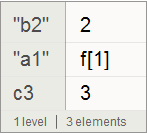Any convenient ways to apply a function to Keys that match a pattern in an Association? Method should handle:
- Mixture of
String,Symboland composite Keys - Preserve the input Association order
- Be efficient
Off the bat, KeyValuePattern only matches a single instance per Association, so normalizing an Association into singleton Associations is not likely to satisfy (3)
Illustrating current gap in functionality rather than a path to solution (Dataset is not strictly necessary but helps abbreviate Queries)
ds = <|"b2" -> 2, "a1" -> 1, c3 -> 3|> // Dataset Note c3 is a Symbol - Suppose the pattern is:
keyPattern = k_String /; StringMatchQ[k, "a*"] This tentative query:
keyPatternQuery[patt_ -> f_][as_Association] := Query[{KeySelect[MatchQ[patt]] /* Query[All, f], KeySelect[MatchQ[patt ] /* Not]} /* Apply[Join]][as]; Fails (2) or would require resorting by input keys, likely failing (3)
ds[keyPatternQuery[keyPattern -> f]] // Normal <|"a1" -> f[1], "b2" -> 2, c3 -> 3|>

